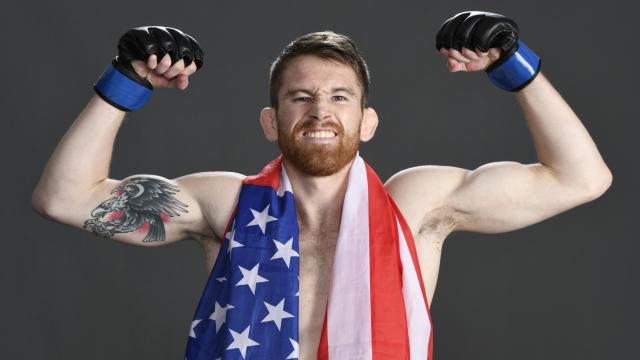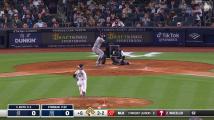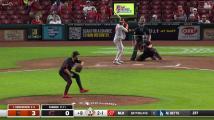Cory Sandhagen talks Frankie Edgar bout, positivity and training with Ryan Hall
No. 2-ranked UFC bantamweight Cory Sandhagen discusses the importance of maintaining a good attitude heading into his Feb. 6 showdown vs. Frankie Edgar at UFC Vegas 18.
Video Transcript
KEVIN IOLE: Hey folks. I am Kevin Iole and on Saturday at UFC Apex here in Las Vegas, Nevada. A really good fight card headlined by Alistair Overeem against Alexander Volkov, a heavyweight fight you don't want to miss. But another really good fight that I think you're going to want to watch is Frankie Edgar against this young man who is on the verge of a title shot, especially if he gets a win here, Cory Sandhagen. Cory, how's it going, my man?
CORY SANDHAGEN: I'm good. How are you?
KEVIN IOLE: I am doing awesome. You know, reading stories about you, looking back, you got the degree in psychology from University of Colorado. I see all these words like head-space and mind set in your interviews that you give. It's almost like you focus on the psychological aspect and the mental aspect of the sport as much as you do the physical aspect. I mean, from what you say in your interviews and on social media.
CORY SANDHAGEN: Oh, absolutely, man. I think you get to a certain level, and even before you get to a really high level, I think it becomes more and more about that. Because there's only so much that your body can do. There's only so much that a person can know before you have to start addressing the other important things, like being able to perform on the night that you're supposed to perform, being able to put out little fires that you're supposed to put out inside of yourself, and dealing with stress and all of those things, man. And I think that that's really what separates the good from the great at some point. And I mean, that's the point that I'm at.
KEVIN IOLE: You know, and you're asked a lot I know about Cory-- I mean, excuse me, about TJ Dillashaw coming back and all this other stuff. And that's kind of stuff that gets you off what's important, like Frankie Edgar and what you need to accomplish in the octagon. How do you deal with that? Because a big part of your job as a UFC fighter is doing this. Doing interviews, talking to people, and you're always going to be asked what's next and things that maybe take your eye off the prize. How do you deal with that where, you do your job, but you don't let it affect you negatively in the head space?
CORY SANDHAGEN: Sure, sure. You just have a good attitude about it, to be honest. You know, like it's things that people want to know about and as long as I kind of come back to the space of, hey, your interview is over. You answered the questions about the future.
You're here is because of Saturday, you're not here because of past Saturdays. So, just reminding yourself that, little reminders. And then just having a good attitude about, you know, when you have to do things like this, it's part of the game. And having a bad attitude about it doesn't do anything about it.
KEVIN IOLE: I read a quote from one of your training partners, Ryan Hall, that I thought was interesting. And he said, you know, he was talking about how you were a smart guy and that you were very introspective. But he said, that can hurt as much as it can help.
And I wonder if you can kind of expound on that. You know, the fact is, you're a guy with a degree and you're a guy with aspirations for life after fighting. So, how does the fact that you are smart and you understand sort of how things work in life and in the sport affect you and make it more-- you know, maybe make it more difficult for you to be the best you can be?
CORY SANDHAGEN: It does. You can't-- you can't really outsmart your way into being brutal, you know? And what we're doing is quite brutal and it's really intense. And I think that, you know, the only way to get good at doing that and putting yourself in a head-space of being really brutal, because that's what you have to walk into a fight being-- Or at least for me.
Balancing that with also making really good decisions in a fight is tricky and it's not easy. And that's where it can-- that's where I can kind of overtake you. Is because you start to kind of put yourself in this compartment of, oh, I'm this smart thinker guy. Let me try to outsmart everyone. When there's a lot of other really smart guys. And you also need to balance it a lot with being brutal and with not thinking sometimes.
Because thinking can sometimes get in the way of reacting, and just balancing the two can be a little bit tricky. And I think some people have to work in the other direction as me, where maybe they come out a little bit too brutal and then they have to kind of smarten up as it goes. I would say in my experience and just coaching in general, that's usually the typical way. But for me, it was the other way around, where I was able to think my way into a lot of wins and now I need some level of brutality in order for me to compete with these really good guys.
KEVIN IOLE: Interesting. I want to ask you one more thing about Ryan and how it affects you. You know, he's been a guy that struggled for years to get fights, right? And it's got to be frustrating. You're sitting there, you feel like you're one of the best in the world.
Nobody wants to fight you. And you saw how he handled that and how he dealt with it. Did you take anything from the way-- the patience he showed and the ability he had to deal with the adverse situation going in front of them that you can apply to your game?
CORY SANDHAGEN: Yeah. I mean, since I've met Ryan, about a year and a half ago, man, I have felt so blessed to just-- to learn from that guy, not only in fighting, but just listen to him talk. Just watch his-- watch his thinking process is super interesting to me too.
And I've learned a ton from that guy in all areas of fighting and in life too. And we've become good friends now. We train together, usually around once a month.
And I I'm really, really grateful for that guy being a part of my life, because he just thinks in a different way and it's helped me think in a different way. Because you have to be a little bit different and you have to think a little bit of a different way. And the way that he does things works well for me also.
KEVIN IOLE: I talked to Frankie Edgar yesterday, you know, and he talked a lot about being positive and believing-- you know, believing in himself and that helping-- helping him to lead to success. But, you know, at the end of the day, when you're doing what he's doing, I think today is his 14 year anniversary in the UFC. So, you know, you have to do a lot right physically.
When you look at Frankie Edgar, what do you think it is that has kept him at the top of the sport through three divisions over 14 years? I think you were a freshman in high school when he first started in the UFC. Like, what in your opinion, what is it that has kept him at such a high level for so long?
CORY SANDHAGEN: I think-- I mean, in my opinion, because I don't know, I think Frankie must love it a lot. He must love fighting a lot. He must love training a lot. And I think it shows, because he is one of those guys that didn't quit when he was ahead.
You know, he's still fighting. He's quote, unquote, "past his prime" and a lot of people write him off, because he's, quote, unquote, "past his prime". But I think in order to do so, you have to have a really serious love for the sport and for fighting.
And I think that he has that and I think it shows in his fights. Where it might not be where he's smiling and maybe having a huge enjoyment in the fighting, but I think that he enjoys challenges and he enjoys conquering his demons. And I would say that his love for the game is what's taken him this far.
KEVIN IOLE: I don't think there's any question that if you ask Frankie Edgar, he say, I'm a fighter. Right? If I asked you, are you a martial artist or are you a fighter? What would you say you are?
CORY SANDHAGEN: Well, it depends what I have to be. What do I have to be, you know? If I have to be a fighter for a fight, then, you know, let's get brutal and I'll be a fighter. If I need to be smarter and if then, you know, I'll be the martial artist.
Bruce Lee says that the art of fighting without fighting or having no style is style. That's what I try to be. Whatever I need to be, I'll be. And as long as-- you know, I have that. Everyone has a fighter inside of them.
They might not know it or how to bring it out of them, but they have it. And everyone also has a martial artist side to him, where they care about that too and whether they know it or not. And, you know, I would say that I'm both, depending on when I need to be.
KEVIN IOLE: You know, Bruce Lee's famous line of be like water, right? You know, and all that and adapt to what you want. But when Bruce Lee was in his prime, you know, there was no UFC and, you know, he didn't have to train for guys like you that are training two months to fight him and to do all that kind of stuff.
So, how does it-- you know, like, you say, be like water? You got to adapt to the situation, but you're training two months for a guy you don't know what he's really going to do. Right? So, how do you balance like, OK, I just want to be adaptive, with also coming in with a game plan and prepared to compete against one of the best in the world?
CORY SANDHAGEN: Yeah. It's-- I honestly don't focus a ton on the opponent. You know, I don't watch a ton of tape. I watch some tape, of course. It's not a ton. And-- you know, but a lot of my training is, hey, I'm not very good at this area.
So, let me get better at this area. Or this is a really common area that I don't feel like I'm an expert on, so let me become an expert on this area. And I've always found in the past, when I focus too much on the strategy part and focusing too much on the opponent, that I start to lose what makes me an actual better fighter.
And of course, there are balance still, but of course, there are little tidbits of like hey, this person does this a lot. Let's make sure that we're ready for this. There's always that, but man, a lot of the training that I do is around me.
KEVIN IOLE: Interesting. Do you feel like you see-- you know, you had a very impressive win your last time out over his former teammate, Marlon Moraes. Do you feel like you've added to your game since then or are you a better fighter going into Frankie Edgar than you were going into Marlon Moraes?
CORY SANDHAGEN: Yeah, absolutely. I think, man, like I said, man, working with Ryan Hall has helped me so much. Every time I work with that guy, he teaches me something new.
And me and him were actually able to get together, I think, three-- three separate times before-- before this fight. And I have a lot of confidence in what he's helped me with. And I definitely think that there's a few things that really were a game changers for me that he taught me, that I think are going to really pay dividends in this fight.
KEVIN IOLE: Oh. I can't wait to see what that is. I'll have to make sure I ask you about that on Saturday. Let's wrap up kind of talking about this. I mean, I think most people's default these days has been the lightweight division is the best division in the UFC.
But you look at the bantamweights and you look at that list of the top 10 guys. And I mean, there are some crazy good fighters in that division and there's not a lot of transparency to it. Like, it's not obvious who's going to get-- Yan and Sterling are going to fight for the title, and then after that, you know, does Dillashaw get a shot?
Does Cejudo come back? Do you get a shot? Like, how do you deal with all that nuttiness in the division where there's uncertainty? Is it just, hey, go out and take care of myself and then everything else will take care of itself?
CORY SANDHAGEN: Yeah. I've spent my fair share of hours driving myself crazy with what's going to happen in the future. And I think, because of the nature of the sport and because of the type of career that I'm in, that's only going to continue if I continue to focus on it. So, man, I take one day at a time.
I tell myself that every morning, just one day at a time. One day at a time. And I think good things will happen as long as I'm working hard. And there is a lot of craziness, and there is a lot of nuttiness, and it does get to me sometimes, but that's the nature of what I'm doing. I don't know.
I could get hurt next week after this fight and not be able to fight again in my entire life. And what's it worth to spend a lot of time thinking about that? Or I could get a title shot in March because one of these guys gets hurt. You know, like a million different scenarios could play out. So, I just don't think about the scenarios. I focus on myself, one day at a time.
KEVIN IOLE: I'll tell you, that's a guy you can root for right there in Cory Sandhagen. A guy who-- he admits his strengths, he admits his weaknesses, his foibles and all. He is fighting Frankie Edgar on Saturday on ESPN plus at Apex. Check him out on ESPN+. For Yahoo Sports, I'm Kevin Iole. Cory. Thank you so much.
CORY SANDHAGEN: Thank you so much, Kevin.
KEVIN IOLE: See you, my man.








